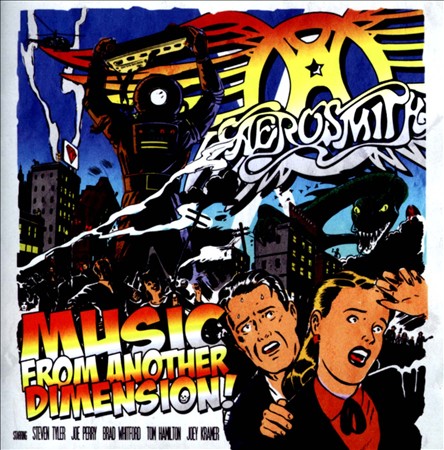
Music From Another Dimension (2012)

1. Love XXX
2. Oh Yeah
3. Beautiful
4. Tell Me
5. Out Go the Lights
6. Legendary Child
7. What Could Have Been Love
8. Street Jesus
9. Can't Stop Lovin' You
10.Lover Alot
11.We All Fall Down
12.Freedom Fighter
13.Closer
14.Something
15.Another Last Goodbye
If Music from Another Dimension is to be judged fairly, it must be placed within the broader arc of Aerosmith’s evolution: a band that once embodied unrelenting swagger, pomp, and blues-soaked hard rock, now returning after an extended hiatus with their first album of original material in over a decade. It is not, by any means, a return to form—but perhaps it was never meant to be. Rather than a reinvention, this is a reaffirmation of tropes long familiar: the sleaze, the strut, the sentimentality, and the showbiz.
From its outset, the album gestures toward grandiosity. A mock-serious sci-fi voiceover introduces the listener to the titular “another dimension”—an artistic conceit that fails to materialize in sonic innovation. In fact, it acts as a thin veil over what is, for the most part, a workmanlike set of songs: competently executed but deeply risk-averse.
Where Aerosmith once thrived on unpredictability and gravel, these tracks too often veer into pastiche. Many could be inserted into any post-Pump album with little notice. Yet, scattered throughout the 15-track main release (and 18 on the bonus version) are glimpses of vitality. Songs such as Luv XXX and Out Go the Lights flirt with funk-inflected bombast, but ultimately retreat into structure and safety. Joe Perry’s vocal turns, notably on Freedom Fighter, offer tonal contrast and serve as some of the more intriguing moments—perhaps less for their intrinsic strength than for the departure they offer from Tyler’s overwrought delivery.
Balladry abounds, as expected, and not always unwelcome. But when the most affecting song is a Carrie Underwood duet—Can’t Stop Lovin’ You—one begins to question the directional compass of the band. The track is impeccably produced, soaring even, but far removed from the dirty-blues core that made Aerosmith legendary.
The sense of strain is palpable. Tyler’s signature vocal idiosyncrasies—once exhilarating—often sound performative here, verging on self-parody. His lyrical innuendos, once rakish, now feel obligatory. There is effort, yes, but not ignition.
It is tempting to view Music from Another Dimension as a final act, an epilogue to a career already cemented in rock’s pantheon. As such, it offers flashes of the band’s enduring musicality, yet is haunted by a deeper question: is this really the sound of a band still creating, or merely curating its own mythology?